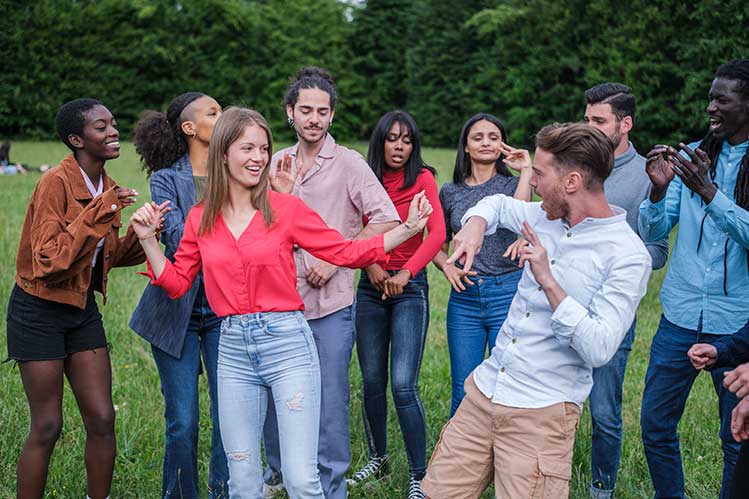Talent Wins Games, but Teamwork Wins Championships

Every manager strives to achieve peak performance from his or her team. Cultivating an environment where teams thrive through cohesion, enhanced problem-solving, and fortified trust is crucial for sustained success. This is precisely where tailored improv team-building experiences can make a significant impact.
Improv team building isn’t just about laughter and entertainment; it’s a strategic tool for unlocking your team’s full potential. By fostering a shared culture and strengthening interpersonal dynamics, these experiences empower teams to navigate challenges with agility and confidence.
Investing in improv team building is an investment in your team’s present and future success. Let’s work together to elevate your team’s performance to new heights through the power of improv.
Team Building Programs, a Few Years Ago…
During the boom of team-building events in the 1990s, corporations widely embraced facilitated team bonding exercises to cultivate stronger teams. As the demand for effective team building grew, programs evolved into elaborate experiences, mimicking game shows and incorporating elaborate sets. Weekend retreats, scavenger hunts, and team bonding picnics became commonplace, all to foster the ultimate high-performance team.

The effectiveness of these initiatives was validated by a 2016 Gallup poll, which highlighted the positive impact of workforce investment on corporate profitability and employee retention. This underscores the significant role that strategic team building plays in enhancing organizational success.
In today’s dynamic business landscape, the need for cohesive and resilient teams is more critical than ever. Explore how tailored improv team-building experiences can drive tangible results for your organization, fostering collaboration, innovation, and sustained performance excellence.
The Challenge Today
Aligning team members’ perspectives was traditionally challenging, particularly for leaders overseeing sizable groups within office settings. However, the paradigm shift toward remote work, accelerated by the pandemic, introduces new complexities. According to McKinsey, transitioning to remote work may exacerbate challenges in fostering alignment and connection among virtual team members. The inherent risk of isolation and disconnection among remote workers threatens to erode the cohesive fabric essential for effective teamwork. Moreover, this detachment from the team dynamic can undermine trust—a cornerstone of effective leadership. Consequently, it is imperative for organizations to proactively cultivate a sense of belonging and inclusion among remote employees to sustain a robust organizational culture.

Signs Your Virtual Team Needs Some Bonding Time:
You can tell that your virtual team could significantly benefit from team-building experiences when:
- Productivity levels dip, and deadlines are overshot.
- There are unresolved conflicts or recurring issues between staff.
- Information isn’t being shared appropriately or on time.
- There is a general lack of trust or negativity in the air.
Virtual Team Building Strategies:
The simple human bond that was once quickly built by a casual “hello” in the morning or a quick chat near the water fountain takes more effort now. As a virtual team manager, you can implement plenty of strategies to stay connected to your employees.
Connect one-on-one: Take a little time weekly to check in with your employees individually.
Show your appreciation: Create a joint digital message board for your team, where you can all compliment another team member on a well-done task.
Virtual Happy Hours: Get your team together to hang out online for a short while, occasionally outside of work hours. For variety, you can include games, quizzes, or other activities.
Invest in virtual team-building experiences: While there are many things you can do to help your team get along, facilitated team-building exercises can help your team connect on a deeper level and solve specific issues.
Why Improv Works for Virtual Team Building:
Most communication is non-verbal. Some experts think that 93 percent of our communication may be nonverbal. Theatre actors learn this early and use their bodies and expressions to communicate their thoughts and enhance the impact of their words. Conversely, they also learn to emphasize what they are saying solely through verbal cues like the tone of their voice or choice of words. It may come as a surprise, but many actors find the latter exercise harder than when using nonverbal cues. If trained actors have difficulty communicating without nonverbal cues, imagine how difficult it can be for your team to communicate when they are separated by time, space, and the internet.
This is where improvisation truly shines. One of the biggest reasons improvisation is perfect for building cooperation and teamwork is that you can’t improvise alone. Unlike tango, improv has space for groups of different sizes. Many improv exercises can be conducted online to help your team build specific skills.
Creative Veins’ Virtual Team Building Experiences:
Creative Veins is the highest-rated performing arts studio in Northeast Florida and is conveniently located in the heart of downtown Jacksonville! Our team-building workshops are facilitated by professionals, most of whom are multi-disciplined and highly trained in acting and improv. Our workshops are customizable, and we can adapt each session to fit your specific goals.
Some popular exercises from our sessions are:
One Sentence Story: Participants choose the names of two characters and a location where the story will take place. One at a time and moving around the circle, each person will state one sentence that will contribute to the story. Story requirements: The story must have a clear beginning, middle, and end. It must have a protagonist in pursuit of a goal and must incorporate both character names and locations into the story while avoiding run-on sentences.
Skills Developed: accepting; anticipating; deduction; flow; listening; logic; support;
I Have A Problem: This game has two players and goes as follows:
Player 1: “I have a problem: _______ (describes problem),”
Player 2: “Here, I have a _________ (a completely random object),”
Player 1: “Great! I can then (do something with the object) to __________ (come up with a solution). Thank you!”
Players high-five, and then two more players have a go. Answers can be funny and random, but the goal is to be supportive and thankful for one another.
Skills Developed: accepting; cooperation; justification; listening; sharing; problem-solving; support
Two Truths And A Lie: Player 1 gives three one-sentence statements about themselves to the rest of the group (two being true and one being a lie). The rest of the players will ask Player 1 one question to find out more and determine which statement is the lie. At the end of the questioning, players will state which one they think is the lie and why. Then, Player 1 will reveal which two statements were factual and which were a lie.
Skills Developed: accepting; advancing; collaborating; focusing; listening; observing visual cues and body language; sharing
One of the most important things we see through these exercises is that even the most tense participants tend to let their hair down and have fun along the way. We are committed to helping you gain the most value from your experience and showing you an enjoyable and unforgettable time!
Contact us and let us know what your needs are. We’ll be happy to help!







